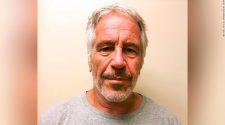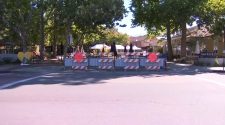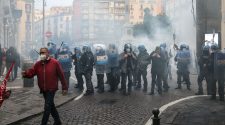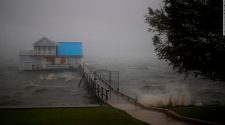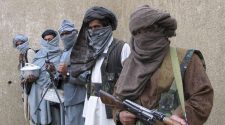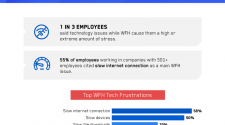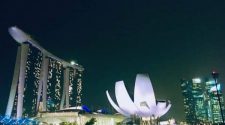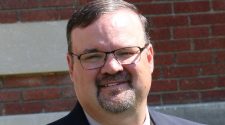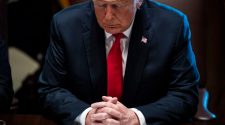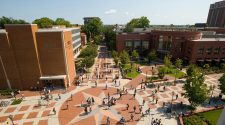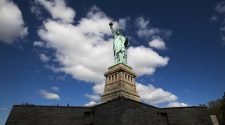By Sunday morning, known cases of coronavirus in the United States exceeded 2,700, spread across 49 states, prompting the mass cancellation of events and the reordering of American public life. Just one week ago, fewer than 500 cases of the illness had been diagnosed in the country.
The scope of the public health crisis became even clearer over the weekend as officials in Louisiana, New York and Virginia reported their first deaths tied to the coronavirus. Only West Virginia was without a single diagnosis.
Nationwide, businesses, schools and public officials continued to struggle with an outbreak that has left more than 50 people dead in the country and upended nearly all aspects of public life. More than 400 new cases have been reported in each of the last three days alone.
In the Omaha, Neb., area, officials reported the first known instance of community spread. In Illinois, a nursing facility where a woman tested positive for the virus was placed on lockdown. And in Pittsburgh, where the first local cases were announced on Saturday, city leaders urged bars to promote social distancing by limiting the number of people they allowed inside.
Elsewhere, officials were making provisions to house and isolate large numbers of people with the virus. But when officials in Washington State chose two locations to house people exposed to the virus, they picked poorer neighborhoods, drawing ire from local officials who noted that their communities had not yet experienced any cases. Dana Ralph, the mayor of Kent, south of Seattle, said residents wondered whether their neighborhoods were being sacrificed to protect wealthier ones.
Their fears came true when a person housed in a converted motel wandered away and boarded a bus. The bus was taken out of service, but the community was angered.
The closing of schools in more than a dozen states continues to create concerns that children may miss meals and parents may not be able to stay home from work.
After Los Angeles Unified School District said that it was closing, school officials said they would open 40 family resource centers to provide child care and meals to students whose parents cannot get out of work. North Carolina on Saturday became the latest state to close its public schools.
Officials announced the deaths of a woman in New York City and a man in Rockland County on Saturday, the state’s first attributed to the virus. And two members of the State Assembly tested positive for the coronavirus.
Warnings that prisons could be overtaken with the virus — as they have in some other countries — began to seem increasingly plausible. On Friday, Washington State said that a prison employee had tested positive for the virus. A jail employee in Hancock County, Ind., also tested positive.
The Bureau of Prisons, which runs federal prisons that hold more than 175,000 people, suspended all visits to prisoners for 30 days, including most by lawyers. And at the county jail in Chicago, the sheriff limited visits to lawyers and members of the clergy, all of whom would be screened for the virus before being allowed inside.
At U.S. airports, passengers coming from Europe describe long waits and confusion.
As the U.S. government rushed on Saturday to implement President Trump’s restrictions on travel from Europe, part of an effort to stop the spread of the coronavirus, chaos ensued at some of America’s biggest airports.
In Dallas, travelers posted photos on Twitter of long winding lines in the airport. In New York, customs agents in paper and plastic masks boarded a flight from Paris. And in Chicago, where travelers reported standing in line for hours, Gov. J.B. Pritzker of Illinois tagged Mr. Trump in a series of angry tweets about the long waits, saying, “The federal government needs to get its s@#t together. NOW.”
Paige Hardy, an American student who left behind her graduate studies in London because she feared a broader travel ban, said a series of confusing announcements in the air and upon landing in Dallas led to alarm on the plane late Saturday. She posted a video on Twitter of travelers being asked to raise their hands if they had been in mainland Europe. Because of the delay, she also missed her connecting flight.
“It truly felt like an apocalyptic scenario,” said Ms. Hardy, who left many of her belongings behind in England and was unsure whether she would be able to return.
The confusion came as concern spread about the coronavirus pandemic, which has now been identified in more than 2,700 people in the United States and has prompted Mr. Trump to declare a national emergency.
“At this time, we are working quickly with our partners to operationalize a plan which will outline where these travelers will be routed and what the screening process will be,” said Marcus Hubbard, a spokesman for the Centers for Disease Control and Prevention.
Chad Wolf, the acting secretary of Homeland Security, said on Twitter that he was aware of the delays and was working to add staffing.
American Airlines said on Saturday that it would suspend almost all of its long-haul international flights beginning Monday in response to decreased demand in the face of the coronavirus pandemic and U.S. restrictions on international travel. The airline said the suspensions would last until at least May 6 and would represent a 75 percent decline in international capacity compared with the same period last year.
The Vatican will close Holy Week celebrations to the public.
The Vatican said on Sunday that its traditional services during the week before Easter, which usually draw tens of thousands of people, would not be open to the public next month.
Holy Week, the week before Easter — which falls on April 12 this year — features a series of events presided over by the pope, including a celebration of Good Friday, which in recent years has been held at the Colosseum in Rome.
Since Italy began locking down cities to try to contain the coronavirus, two of the pope’s weekly events, which also draw large crowds — his Wednesday general audience and his Sunday Prayer — have been livestreamed from the library in the papal palace. Last Sunday, the prayer was shown on two large screens in St. Peter’s Square, which has since been closed.
The Vatican said those two events would continue to be shown by livestream on the Vatican News website through Easter. It gave no details about how the Holy Week celebrations would be carried out.
Italy has been the European country hardest hit by the virus, with more than 21,000 people infected and 1,441 deaths.
Yet even as the country is locked down, Italians are still getting their voices heard. At precisely noon on Saturday, millions of Italians, from Piedmont to Sicily, leaned out of windows or stood on their balconies to applaud the health care workers in hospitals and other front-line medical staff who have been working round the clock to care for coronavirus patients.
Several politicians have tested positive for the coronavirus, and on Friday, Giorgio Valoti, the 70-year-old mayor of Cene, a small town northeast of Milan, died. His son, Alessandro, announced the death on Facebook.
President Trump tests negative for the coronavirus.
President Trump tested negative for the coronavirus, his doctor said in a memo released Saturday evening. The president’s health had been a concern since he spent time at his Florida resort last weekend with a Brazilian official who was later found to have the illness.
“One week after having dinner with the Brazilian delegation at Mar-a-Lago, the president remains symptom-free,” said Dr. Sean P. Conley, Mr. Trump’s doctor, in the memo.
At a news conference earlier Saturday, Mr. Trump said that he had been tested for the coronavirus on Friday night and was awaiting the results. Vice President Mike Pence also announced the extension of the administration’s European travel ban to Britain and Ireland.
Whether the president would be tested had been a matter of speculation since it emerged that a member of a Brazilian delegation that visited Mar-a-Lago had tested positive. Two other people who were with the president at Mar-a-Lago have tested positive, and various members of Congress have been self-isolating after interacting with some of those people.
Mr. Trump said he had decided to be tested after his news conference on Friday, during which he declared a national emergency.
It was unclear whether Mr. Pence, who interacted with some of the infected Mar-a-Lago visitors, had known that the president was tested. Asked about his own status, Mr. Pence said, “I’m going to speak immediately after this news conference with the White House physician’s office,” which he said had previously advised him that neither he nor his wife needed to be tested.
The White House has begun checking the temperature of anyone in close contact with Mr. Trump or Mr. Pence. White House staff checked the temperature of everyone arriving at the news conference.
Spain moves toward a lockdown, and France closes most businesses.
Spain and France announced drastic countrywide restrictions on Saturday to contain the spread of the coronavirus.
Spain ordered all residents to confine themselves to their homes — and to leave only to buy food, go to work, seek medical care or assist the elderly and others in need.
Officials in Spain reported 1,500 new cases, the largest daily increase in the country so far, pushing its total to 5,753. The government ordered all schools, restaurants and bars to close, extending measures that various regional authorities, including in Madrid and in Catalonia, had taken on Friday.
Also on Saturday, the Spanish authorities said that the wife of Prime Minister Pedro Sánchez, Begoña Gómez, had tested positive for the virus.
The measures in both countries follow similar moves in Italy, the hardest-hit country in Europe. Italy has been locked down since early in the week, with only groceries, pharmacies and banks allowed to operate. On Saturday, the country reported 175 new deaths, with a total of 1,441, and 2,795 new cases, with the total crossing 21,000.
As countries increase restrictions, Israel delays Netanyahu’s corruption trial because of the epidemic.
Israeli court officials, citing the coronavirus pandemic, said on Sunday that Prime Minister Benjamin Netanyahu’s long-awaited trial on bribery and other corruption charges, scheduled to begin on Tuesday, would be delayed at least until May 24.
The announcement came hours after Mr. Netanyahu said on Saturday night that digital and technological means would be employed to track citizens known to have contracted the virus — an extraordinary measure that he said had been drawn from Israel’s war on terrorism.
In a televised address, he said that Israel was “at war” against an “invisible enemy.” Acknowledging that the surveillance would impinge on personal privacy, Mr. Netanyahu said he had sought and received permission from the Justice Ministry.
As the country’s caseload rose to nearly 200, the government mandated the closure of all leisure venues starting on Sunday, including cafes, restaurants, gyms and cultural institutions. Public gatherings are to be limited to 10 people, and workers have been told to work from home if possible.
Many other countries increased restrictions or said they might do so:
-
Britain will have the option of forcing people to quarantine themselves if necessary as part of its strategy to fight the coronavirus, Health Secretary Matt Hancock told the BBC on Sunday. “We are going to take the powers to make sure that we can quarantine people if they are a risk to public health,” he said. “I doubt we will need to use it very much, because people are being very responsible and people need to be responsible.”
-
Australia’s prime minister, Scott Morrison, said on Sunday that all international arrivals would have to self-isolate for 14 days. Cruise ships arriving from foreign ports to Australia will also be banned, he said.
-
The government of Jordan said it was suspending all incoming and outgoing passenger flights. Jordanian officials said all schools and universities in the country would be suspended for two weeks and mosques, churches, gyms, cinemas, youth centers and swimming pools will also close.
-
The Afghan government closed all schools and universities for a month and asked people to avoid weddings and engagements — events that usually draw thousands. The war-torn country, which shares a porous border with Iran, reported its 11th case on Saturday. But testing is severely limited, so it’s hard to gauge how widespread the outbreak is.
-
Indonesia reported a sharp increase that raised its number of cases to 117, with five deaths. The governor of Jakarta said that schools in the capital would close for two weeks. The transportation minister, Budi Karya Sumadi, has tested positive.
-
Singapore has closed all its 70 mosques for five days to disinfect them, after the spread of the virus in at least three countries — Malaysia, Brunei and Singapore — was connected to a gathering of 16,000 people at a mosque near the Malaysian capital, Kuala Lumpur. Four cases in Singapore have been linked to that gathering, which was attended by more than 90 Singaporeans.
-
Prime Minister Jacinda Ardern of New Zealand said that all people arriving in the country after Sunday night would have to isolate themselves for 14 days. The measure applies to citizens and foreigners.
-
Nepal said it would enforce a 14-day quarantine for all international visitors starting from Saturday, with Nepalis allowed to do so at home and foreigners subject to “self-quarantine.” Officials said that any person suspected of having the virus would be taken to an isolation center.
-
Rwanda reported its first case, an Indian national who arrived on March 8 from Mumbai. The man sought medical help on Friday, the health ministry said.
-
Namibia reported its first two cases: a Spanish couple who arrived there on Wednesday. They are both under quarantine, Health Minister Kalumbi Shangula said on Saturday.
In Manila, a lockdown stirs old fears about martial law.
Manila, the densely populated capital of the Philippines, went under lockdown on Sunday as the government sought to assure citizens that the heavy presence of security forces did not herald a return to martial law.
To stop the spread of the coronavirus, President Rodrigo Duterte’s government has banned public gatherings, suspended classes for a month, imposed a limited curfew and restricted travel in and out of the Manila metropolitan area. Soldiers and police officers set up checkpoints on Sunday morning, stopping vehicles and checking the temperatures of people inside.
Mr. Duterte announced the measures on Thursday, emphasizing that they were to protect the public and that there would be no return to military rule. Many Filipinos have vivid memories of decades of martial law under President Ferdinand Marcos, who was driven out of power in 1986.
“Do not be afraid of the soldiers — these are your soldiers,” Mr. Duterte said. “The armed forces is there to serve you and they are under orders from civilian authorities.”
Mr. Duterte, an admirer of Mr. Marcos, placed the southern island of Mindanao under martial law for more than two years after an Islamist uprising there. During that time, he mused that it might become necessary to extend it to the whole country.
Carol Araullo, head of a civic group, Bayan, said Mr. Duterte’s lockdown order “appears to focus mainly on limiting the movement of the people rather than addressing the more urgent health requirements and economic needs” of Manila residents. She said it included no provisions for a quarantine system or free testing for the capital’s many poor people, nor did it deploy “doctors, nurses and other health workers in the communities.”
The Philippines has confirmed 111 coronavirus infections and eight deaths. A lawmaker said Sunday morning that an employee of the Philippine House of Representatives had died after testing positive for the virus.
“The whole House of Representatives is saddened,” the lawmaker, Rep. Jericho Nograles, said in a radio interview. “At the same time, we are also worried about the people he had contact with.”
Chinese journalists push back against a crackdown on virus coverage.
Eager to claim victory in what Xi Jinping, China’s leader, has called a “people’s war” against the virus, the Chinese government is leading a sweeping campaign to purge the public sphere of dissent, censoring news reports, harassing citizen journalists and shutting down news sites.
But Chinese journalists, buoyed by an outpouring of support from the public and widespread calls for free speech, are fighting back in a rare challenge to the ruling Communist Party.
They are publishing hard-hitting exposés describing government cover-ups and failures in the health care system. They are circulating passionate calls for press freedom. They are using social media to draw attention to injustice and abuse, circumventing an onslaught of propaganda orders.
The authorities have struggled to rein in coverage of the outbreak, in part because the Chinese public has resorted to innovative methods to preserve a record of what has transpired.
The magazine Profile, for example, recently published a damning interview with a doctor who was warned not to share information about the virus as it first spread in the city of Wuhan. The article almost immediately disappeared.
But Chinese internet users quickly brought the story back to life, using emojis, morse code and obscure languages to render the interview in ways that would evade censors.
“This time the government’s control of free speech has directly damaged the interests and lives of ordinary people,” said Li Datong, a retired newspaper editor in Beijing. “Everyone knows this kind of big disaster happens when you don’t tell the truth.”
China’s tally of new coronavirus infections rose slightly on Saturday, but most were among travelers coming from abroad, as transmissions within its borders continued to peter out. Just 20 new cases were reported in the latest daily count — four in Wuhan and the rest among recent arrivals to the country.
There were also 10 more deaths from the virus, the authorities said, bringing the official death toll to 3,199. The Chinese government’s total infection count for the coronavirus is now 80,844.
17,700 bottles of hand sanitizer, and nowhere to sell them.
While millions of Americans search in vain for hand sanitizer to protect themselves from the coronavirus, Matt Colvin is sitting on 17,700 bottles of the stuff, with little idea where to sell them.
On March 1, the day after the first coronavirus death in the United States was announced, Mr., Colvin and his brother Noah cleared the shelves of hand sanitizer at stores in Chattanooga, Tenn. Noah Colvin followed that up with a 1,300-mile, three-day road trip through Tennessee and into Kentucky, filling a U-Haul truck with thousands of bottles of sanitizer and thousands of packs of antibacterial wipes.
The next step: list them on Amazon. Mr. Colvin said he had posted 300 bottles of hand sanitizer and immediately sold them all for $8 to $70 each, multiples higher than what he had bought them for.
To him, “it was crazy money.” To many others, it was profiteering from a pandemic. And the next day, Amazon pulled his listings and thousands of others.
The company suspended some of the sellers and warned many others that if they kept running up prices, they’d lose their accounts. EBay soon followed with even stricter measures, prohibiting any U.S. sales of masks or sanitizer.
“It’s been a huge amount of whiplash,” Mr. Colvin said. “From being in a situation where what I’ve got coming and going could potentially put my family in a really good place financially to ‘What the heck am I going to do with all of this?’”
To regulators and many others, such sellers are sitting on a stockpile of medical supplies during a pandemic. The attorney general’s offices in California, Washington and New York are all investigating price gouging related to the coronavirus.
After The Times published an article featuring Mr. Colvin, he said he was exploring ways to donate the supplies.
A cruise ship is heading to France after two former passengers tested positive in Puerto Rico.
An Italian couple tested positive for the coronavirus in San Juan, Puerto Rico, late on Friday, five days after they disembarked a cruise ship heading across the Atlantic.
Costa Cruises, an Italian subsidiary of Miami-based Carnival Corporation, says the ship, the Costa Luminosa, is now heading to Marseilles, France.
The Costa Luminosa set sail on March 5 from Fort Lauderdale, Fla., for a trans-Atlantic voyage. The ship called for an ambulance when it docked in San Juan on March 8.
Puerto Rican doctors suspected that the woman, 68, had the coronavirus and hospitalized her. Her husband, 70, was asymptomatic. By the time Puerto Rico announced the hospitalization, hundreds of passengers had spent the day mingling in colonial Old San Juan, and the ship had left port.
It took five more days to confirm the cases. The island had no tests, so samples were taken from the couple and sent to the Centers for Disease Control and Prevention in Atlanta.
Gov. Wanda Vázquez of Puerto Rico called the delay “unacceptable.”
All the while, the Costa Luminosa has been at sea, passengers circulating freely. Shows have been canceled, but the gym, pool and Jacuzzi remain open. Only on Saturday did the crew rework the lunch buffet to serve passengers directly, said Kathryn Bitner, a 66-year-old passenger from San Diego, Calif.
“No one I know of has been tested in our ship,” Ms. Bitner said in a WhatsApp message.
Costa Cruises said that the ship was not in quarantine, but that the “sanitary protocol” on board had been increased and close contacts of the passengers who tested positive had been isolated in their cabins. Costa Cruises also said that it was instituting a daily temperature check for crew and passengers.
The ship’s final destination is unclear. Passengers were first told that they would get off in the Canary Islands, off West Africa. Then Málaga, Spain. But it now appears that Spain is suspending new cruise ship arrivals, and passengers got a letter from the cruise ship company Friday night telling them that the latest plan is to disembark in Marseille, France, on March 19.
Costa Cruises said that it would be contacting the French authorities to report the health situation onboard and that any special rules for disembarkation would be “strictly” followed.
On Saturday, Puerto Rico officials said that another ship, the Celebrity Summit, a Royal Caribbean ship that had been scheduled to disembark in San Juan, would not be doing so after a Canadian woman who had been on the ship tested positive for coronavirus. Puerto Rico officials said that they would allow the ship to resupply, but that they would delay any departures for a week.
Georgia pushes back its primary, but other U.S. states plan to vote on Tuesday.
The move comes as officials in the next four states scheduled to vote in the primary — Arizona, Florida, Illinois and Ohio — have all indicated that they intend to hold their elections on Tuesday as planned.
Louisiana on Friday became the first state to postpone its primary, announcing that the April 4 election would be delayed by more than two months.
The Georgia primary will now be held May 19. The decision by Georgia, announced Saturday night, comes as the viral outbreak has upended the presidential campaigns and people worry about gatherings and places where they might become infected.
Reporting was contributed by Mitch Smith, Elisabetta Povoledo, Andrea Salcedo, Austin Ramzy, Jason Gutierrez, Mariel Padilla, Robert Chiarito, Isabel Kershner, Mujib Mashal, Najim Rahim, Livia Albeck-Ripka, Hannah Beech, Marc Santora, Julie Bosman, Richard Fausset, Johanna Berendt, Richard C. Paddock, Muktita Suhartono, Elian Peltier, Damien Cave, Javier Hernandez, Zolan Kanno-Youngs, Mihir Zaveri, Patricia Mazzei, Frances Robles, Badra Sharma and Annie Karni.

